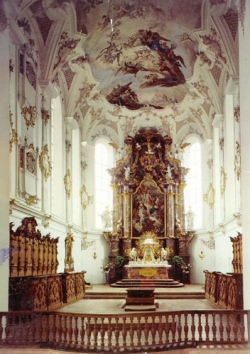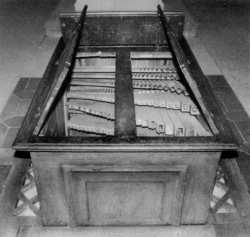

Mönchsdeggingen, Chororgel


Paulus Prescher 1693
State of preservation: mostly original. Pipes in an angle of about 20° in a case about half embedded in the floor of the choir. The pedal was added in 1757; tuning attachments to the pipes of an unknown later date.
Paulus Prescher's choir organ is one of the few and earliest preserved examples of an organ with (almost) horizontal pipes. To keep a clear view to the altar the instrument is embedded within the floor. It represents a diapason organ with only one alternative (Principal 4’/Flauto 4’). The lack of compound stops is apparently due to the extremely limited space in the case which also prevented any change of the pedal to widen its compass. Thus the instrument reveals what was behind the odd pedal compass of C - gis0 so common in southern Germany: Its higher octave is a repetition of the lower but containing all the semitones (C#, E flat, F#, G#) missing in the lower short octave.
Music sample
Johann Caspar Simon: Präludium and Fugue in D
played by Kurt-Ludwig Förg
Specification
I+aP; manual C-c3, pedal C-gis0; short octaves)
Copel 8’
Principal 4’
Flauto 4’
Oktav 2’
Quint 1½’
Cembalo 1’
Subbaß 16’
(attached pedal)
© Greifenberger Institut für Musikinstrumentenkunde | info@greifenberger-institut.de



